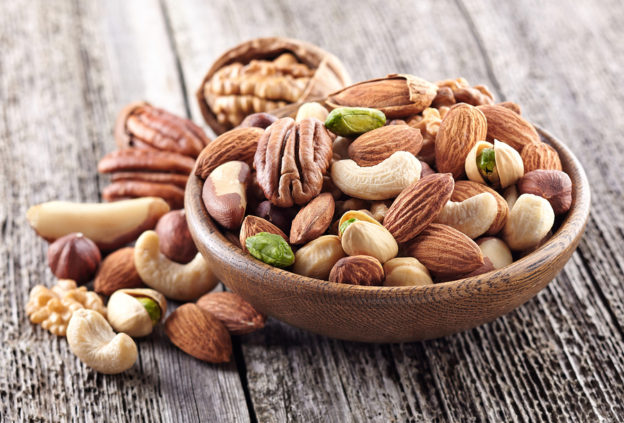By David Blyweiss, M.D., Advanced Natural Wellness
January 3, 2020
“Sometimes you feel like a nut… sometimes you don’t!”
This jingle immediately comes to my mind when I think about nuts. But in all seriousness, I do love nuts.
My days here at the clinic can be pretty hectic. And like many people, I don’t always have enough time to sit down and eat a meal at lunch.
On days when that happens, you’ll often find me munching on a handful of almonds, walnuts, or cashews.
Then, when mealtime comes around, I’ll add sliced almonds, walnuts or roasted pine nuts to my salads. The health benefits of pine nuts would blow your mind!
Eating nuts for snacks and with meals comes with a few immediate benefits. They’re a great source of protein. Plus, they’re also very high in healthy fats. This combination goes a long way when it comes to satisfying hunger.
However, they also come with some pretty hefty long-term health effects that make them a perfect food any time of the day, whether you’ve missed lunch or not.
Now, some of my patients have this idea nuts aren’t good for you. They think of nuts as a forbidden snack that will cause them to gain weight.
However, this simply isn’t true.
MD Exposes the Hidden Danger to Your Eyes

When your eyesight starts to fail, it's a real problem. Suddenly you can't go to the grocery store... you can't get to the doctor if you have an emergency... you can't meet your friends for dinner…
Your "regular" doctor doesn't have time to keep up with the latest research. And the same goes for eye doctors. They go to school to learn how to fit you for glasses and contacts, but have no way of preventing the damage and loss of eyesight that threatens your freedom and independence.
Let me show you something that explains a LOT about how your eyes work.
In my FREE Special Report, I'll show you a HUGE, untapped resource for your eyes that safely and naturally restores clear, effortless eyesight.
Click here to get started...
In fact, eating just a handful or two of unsalted nuts daily can actually boost your ability to lose weight.
Research repeatedly shows people who eat nuts regularly have a lower body mass index (BMI), a better waist-to-hip ratio and greater weight loss than those who don’t eat them. And if they’re already normal weight, they tend to experience less weight gain over time.
So let’s put that myth to rest right now and get on with some of the great things that can happen when you add nuts back into your diet.
Here’s What a Handful of Nuts Every Day Can Do for You
Nuts are loaded with all sorts of vitamins, minerals, antioxidants, and phytosterols that can delay – perhaps even prevent – some of the problems that plague Americans as they age.
They’re best known for their ability to stave off heart disease.
Just a few years ago, there was a study that showed some major results. When people ate a single serving of four Brazil nuts, it improved their LDL/HDL ratio for a total of 30 days.
That’s right – four nuts lowered LDL and increased HDL for a full month.
Now, LDL and HDL are what everyone thinks about when it comes to their heart health. A good ratio between the two is important.
But even more crucial is the size and number of your LDL particles.
When you have a lot of small, dense LDL particles, it opens you up for plaque build-up and blockages. And higher concentrations of a substance called apolipoprotein B (ApoB) in your blood can increase the number of plaque-causing LDL particles you have.
In fact, ApoB is now considered a top predictor of heart health. So lowering concentrations of this substance is one of the best things you can do for your heart.
And guess what?
Nuts are a perfect way to lower your ApoB levels. So adding nuts to your diet will go a long way to improving your heart health.
But there are even more heart-healthy benefits that come with eating nuts.
The World's Quickest Solution for Ending Prostate and Urinary Misery
This has recently been revealed to be one of the only real breakthroughs in prostate health.
The seeds of a strange fruit (sometimes called "Chinese Apples") hold powerful phytonutrients that are a revolution in prostate health.
In fact, UCLA and Veterans Administration research have now proved this to be true.
Not only that, but it may be the worlds quickest solution for ending prostate misery.
Simply stated, these phytonutrients represent a huge step beyond beta sitosterol, saw palmetto, and other phytosterols alone.
Simply click HERE if you want to have fast prostate relief...restful, uninterrupted sleep...no more constant "urges to go"...enhanced virility...and optimal prostate support for life.
Most nuts and nut butters are high in potassium and magnesium. These are two minerals your heart needs to function. They also help offset the effects of too much sodium in your diet.
Plus, nuts can have a profound effect on your endothelial function, blood pressure, and homocysteine levels – three important factors in maintaining a healthy cardiovascular system and protecting against heart disease.
They also protect against the development of type 2 diabetes, which can further reduce the burden on your heart health.
It’s no wonder nut eaters have a lower risk of stroke and heart attack!
Here’s one more bit of good news about nuts.
Get a Little More Protection against Cancer
The biggest nut breakthrough, by far, is recent data showing that eating more nuts can help ward off numerous types of cancer.
Women who eat nuts more two or more times a week have about a 13% lower risk of developing colon cancer and about a 35% lower chance of pancreatic cancer. Nuts also cut the risk of breast cancer by two to three times.
In vitro studies show nuts may be beneficial for cancer of the prostate, too. For men diagnosed with this condition, five or more servings of nuts a week lowered the risk of death due to prostate cancer by about 34%.
Eating nuts regularly also greatly decreases your chances of death from other forms of cancer.
So go ahead. Grab a handful of nuts.
And don’t feel guilty when you munch on them as a between-meal snack. (If you don’t like eating them alone, try adding them to salads and stir fries.)
There’s just one more important point I’d like to make…
There’s One ‘Nut’ You Should Avoid At All Costs
It’s called the peanut.
Believe it or not, this food that most folks consider the “king of nuts” isn’t even a nut. It’s a legume – like a pea or a bean.
And these crunchy impostors are one of the top allergens in the world today. They also contain proteins that are resistant to digestion and are considered toxic.
Even worse, peanuts contain aflatoxin, a natural toxin produced by certain strains of mold. Aflatoxin is a carcinogen that’s been shown to cause cancer in rats.
Instead of peanuts, choose Brazil nuts, walnuts, pecans, pistachios or other tree nuts. Buy organic, unsalted brands… and enjoy a life that’s all the healthier for it.
SOURCES:
Jackson CL, et al. Long-term associations of nut consumption with body weight and obesity. Am J Clin Nutr. 2014 Jul;100 Suppl 1:408S-11S
Lairon D, et al. Dietary fiber intake and risk factors for cardiovascular disease in French adults. Am J Clin Nutr. 2005 Dec;82(6):1185-94.
Colpo E, et al. A single consumption of high amounts of the Brazil nuts improves lipid profile of healthy volunteers. J Nutr Metab. 2013;2013:653185.
Afshin A, et al. Consumption of nuts and legumes and risk of incident ischemic heart disease, stroke, and diabetes: a systematic review and meta-analysis. Am J Clin Nutr. 2014 Jul;100(1):278-88.
Yang M, et al. Nut consumption and risk of colorectal cancer in women. Eur J Clin Nutr. 2016 Mar;70:333-337.
Bao Y, et al. Nut consumption and risk of pancreatic cancer in women. Br J Cancer. 2013 Nov 26;109(11):2911-6.
Soriano-Hernandez AD, et al. The protective effect of peanut, walnut, and almond consumption on the development of breast cancer. Gynecol Obstet Invest. 2015;80(2):89-92.
Wang W, et al. Nut consumption and prostate cancer risk and mortality. British Journal of Cancer (2016) 115, 371–374.
Wu L, et al. Nut consumption and risk of cancer and type 2 diabetes: a systematic review and meta-analysis. Nutr Rev. 2015 Jul;73(7):409-25.







